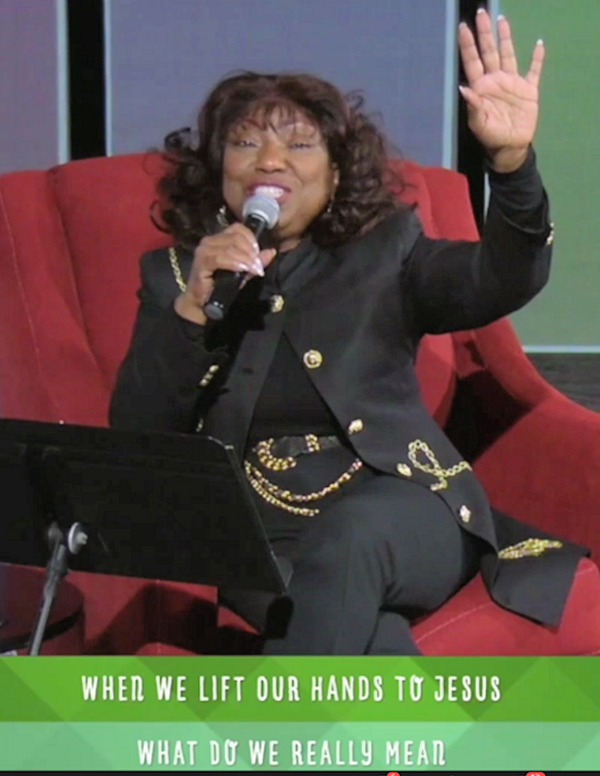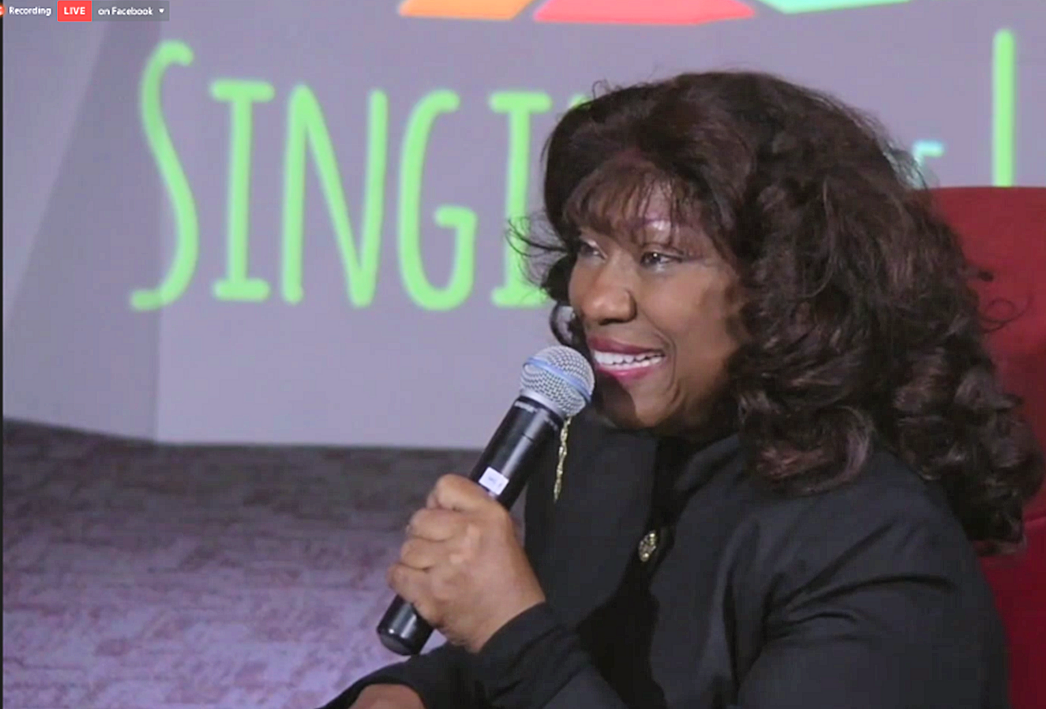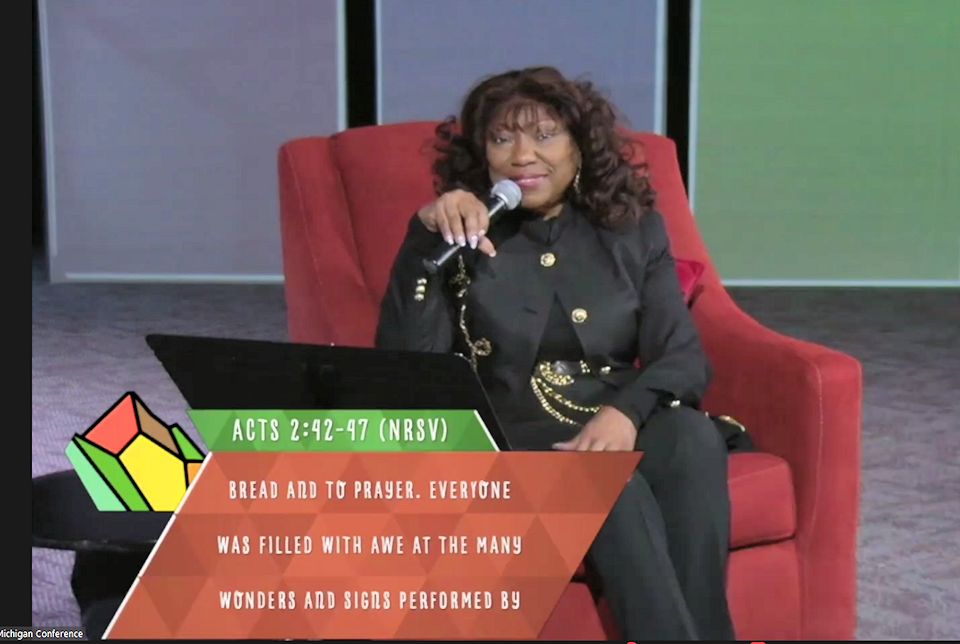The Rev. Dr. Cynthia Wilson, the featured teacher at the 2021 Michigan Annual Conference, took members across time and space to expand their understandings of worship and music.
KAY DEMOSS
Senior Content Editor

June 4, 2021 | LANSING — When “Singing the Lord’s Song” is the annual conference theme, who do you invite to be the guest teacher/preacher? The Rev. Dr. Cynthia Wilson, of course!
Wilson is the Executive Director of Worship Resources at United Methodist Discipleship Ministries. She leads The United Methodist Church’s efforts to develop resources and training with a primary focus on music, liturgy, and preaching. On Friday afternoon of the Michigan Annual Conference, she expanded on the conference theme in a teaching session entitled, “Intentional, Intergenerational Discipleship through Worship.”
The session incorporated video, songs, and history to illustrate the “synthesis of cultures” across time and place. Wilson referenced Native American music, Vatican Two, the Nairobi statement of the Lutheran Church, the thoughts of Danish theologian Soren Kierkegaard, and experiences in South Africa, Australia, and Russia in her moving presentation.
Turning to the Pentecost experience as told in Acts 2, Wilson said, “How are they able to sing this strange song in another land? … Much like we read in the second chapter of Acts, where the various tribes have gathered together as they have been instructed by Jesus … they come together as a synthesis of their various cultures.”
Wilson said the elements of singing the song in a strange land include:
- the spirit of fellowship
- the spirit of joint partnership
- the spirit of participation
- the spirit of communion
- the spirit of sharing and caring
- the spirit of intimacy
She explained. “This synthesis of cultures begins to bring together a united front … it is the spirit of the beloved community, it’s in the spirit of a created community of koinonia (Greek meaning participation or communion). It’s in the spirit of ubuntu (Shona for I am because you are). It is in the spirit of Comunidad (Español for a collective body). In the spirit of sawubona (Zulu meaning I see you.).”
And God is at the heart of such community. “…the liberating presence of God our creator who loves us. Who loves us enough to send the power in the presence of the Holy Spirit to give us a song that we could all sing.”

The conference teacher said the Lord’s song must be …
- Contextual — varying according to the local situation (nature and culture);
- Cross-Cultural — making possible sharing between different local cultures;
- Transcultural — the same substance for everyone, everywhere, beyond culture;
- Counter-Cultural — challenging what is contrary to the Gospel in a given culture.
“How do we sing the Lord’s song folks in a strange land? … The Song of the Lord must be contextual. … Contextual song varies according to a local situation. The contextual song is both from the natural way of being and from what is going on in a particular culture. … Secondly, the Lord’s song must be cross-cultural. The cross-cultural song makes it possible for those singing to share between their local cultures. …Then thirdly, if it’s going to be the Lord’s song, it must be transcultural. Meaning the same substance for everyone everywhere, beyond culture. Fourthly, in the Nairobi Statement, the Lutherans suggested that the Lord’s song must be counter-cultural. Simply meaning that this song must be challenging.”
Wilson introduced Soren Kierkegaard as one who turned the focus of worship away from pastors as lead actors and actresses, renaming leaders as prompters in worship. This restored the congregation as actresses and actors, “creating this drama unfolding before an audience of one, God and only God.” When this understanding prevails, songs “become a conveyor belt moving people along in a peaceful, beloved community essence,” Wilson stated.
“Music brings sawubona, ubuntu, koinonia, those rhythms and harmonies, those notes, the way in which they come together brings about a peace that passes all understanding,” she continued. “I have a feeling that if we really get serious about the ways in which we can sing the Lord’s song, even in strange times, even in COVID, we can sing and never get tired.”

The teaching segment closed with Wilson sharing an experience teaching in a high school in Fort Worth, TX. “I found myself in my choir room, sitting with a young man who was just distraught. And he would say to me, ‘Dr. Wilson, I have all of this music in my belly, and I want to sing, but the church won’t … They won’t let me sing my song.'” She was speaking of Kirk Franklin, now renowned for leading urban contemporary gospel choirs. She ended her presentation by singing and praising the power of song to transform lives.
Click here for the full transcript of the Rev. Dr. Cynthia Wilson’s teaching.
~ More about the Rev. Dr. Cynthia Wilson. Before joining the staff of Discipleship Ministries, Dr. Wilson served as Assistant Vice-President of Student Life and Dean of Students at Garrett-Evangelical Theological Seminary. At Garrett-Evangelical, she launched the Center for Music and Worship in the Black Church Experience, a one-of-a-kind North American Institute that provides training in the sacred music of the Black Church and beyond for musicians and worship leaders.
Last Updated on September 20, 2022

